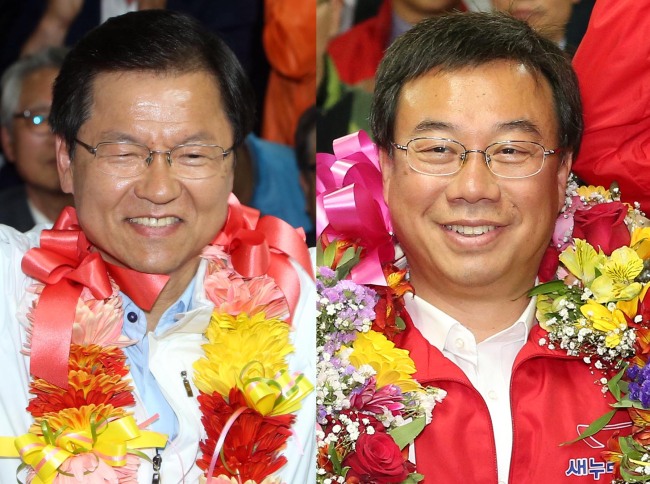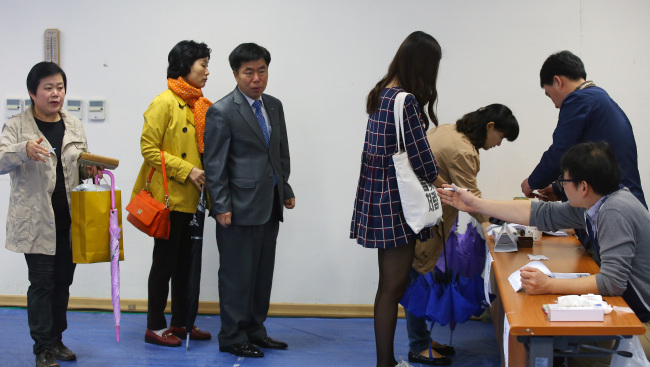Saenuri scores resounding victory in by-elections
Main opposition loses to party defector in stronghold
By Korea HeraldPublished : April 29, 2015 - 18:33
The governing Saenuri Party unexpectedly emerged as the overall winner in parliamentary by-elections Wednesday, despite suffering from a corruption scandal.
The victory effectively gives the party a mandate to push through the administration’s reform plans and economic initiatives.
The conservative party prevailed in three of the four contested districts, dealing a crushing blow to the main opposition New Political Alliance for Democracy, which won none.
The victory effectively gives the party a mandate to push through the administration’s reform plans and economic initiatives.
The conservative party prevailed in three of the four contested districts, dealing a crushing blow to the main opposition New Political Alliance for Democracy, which won none.

The liberal opposition was defeated even in its traditional stronghold of Gwangju by Chun Jung-bae, an independent candidate who defected from the party. Chun’s win, with 52.37 percent of the votes, leaves the NPAD with an uphill battle to realign its policy drives and mend its factional struggles.
Three Saenuri candidates won comfortable victories in Seoul and nearby cities. Shin Sang-jin won in Seongnam, Gyeonggi Province, taking 55.9 percent of the votes. Ahn Sang-soo won in Incheon with 54.11 percent.
In the most closely contested district of Gwanak, Seoul, Oh Shin-hwan triumphed with 43.89 percent of the votes, as liberal votes were split by the NPAD’s Jung Tae-ho and Chung Dong-young, a former opposition presidential candidate running as an independent.
The majority governing party increased its seats in the 298-member National Assembly to 160, while the main opposition holds 130.
Turnout was 36 percent, with 256,232 voters showing up at polling stations, the National Election Commission said.
The polls were held to fill four seats vacated by members of a defunct leftist party and a Saenuri official found guilty last month of violating election laws in 2012.
Analysts said the Saenuri Party’s win has secured it a stronger position to lead future talks in the Assembly on reforms pursued by the Park Geun-hye administration.

The party also showed some recovery from negative public opinion against it sparked by a graft scandal involving the party’s top officials. Eight Saenuri officials were accused of taking illegal campaign funds from the late Sung Woan-jong, who claimed to have given billions in unlisted funds to them since 2007.
The win also offered Saenuri chair Rep. Kim Moo-sung a chance to expand his clout within the conservative party as an alternative force to the mainstream pro-Parks, the faction backing the president, pundits said.
The political reform initiative, reiterated by Park through her chief press secretary a day before the elections, also gained momentum.
The bills pushed by Park and the ruling party include one aiming to invigorate crowdfunding in South Korea’s conservative business culture and another draft amendment targeting the public service pension, a source the ruling bloc has blamed for the snowballing national debt.
The win also offered Saenuri chair Rep. Kim Moo-sung a chance to expand his clout within the conservative party as an alternative force to the mainstream pro-Parks, the faction backing the president, pundits said.
The political reform initiative, reiterated by Park through her chief press secretary a day before the elections, also gained momentum.
The bills pushed by Park and the ruling party include one aiming to invigorate crowdfunding in South Korea’s conservative business culture and another draft amendment targeting the public service pension, a source the ruling bloc has blamed for the snowballing national debt.

“The election does not change the majority party. Nor will it change the president’s attitude,” said Chung-Ang University professor Choi Young-jin.
One of the most heated competition took place at Gwangju, the traditional stronghold of the liberals. The seat was heavily contested by opposition-turned-independent Chun Jung-bae, Jung Seung of the Saenuri Party and Cho Young-teck of the NPAD, among others.
“I will eradicate regional discrimination, reform the opposition and fundamentally change Korean politics,” Chun said in his victory speech
The overall outcome of the by-elections, however, would be lesser than anticipated, as the elected lawmakers will only serve a one-year term before next year’s general elections.
“If you take out Gwangju, an area the opposition fought over amongst themselves, there were only three districts the ruling and opposition blocs were contesting,” said Yoon Pyung-joong, professor at Hanshin University.
“That means it will be difficult to gauge public opinion of the Park administration.”
“Moon has always been viewed as a Roh lieutenant,” Yoon said in reference to former President Roh Moo-hyun. “That image of being under Roh’s shadow has always been a weakness for him.”
The disappointing results will consequently weaken Moon’s foothold in the opposition party, but he will still hold onto the leadership position as the bloc lacks an alternative figure who can be projected as the next presidential candidate, the pundits said.
Moon served as Roh’s chief of staff and secretary before running in the 2012 presidential race against Park. Analysts view him as a leading opposition candidate in the 2017 presidential election.
By Jeong Hunny (hj257@heraldcorp.com)
One of the most heated competition took place at Gwangju, the traditional stronghold of the liberals. The seat was heavily contested by opposition-turned-independent Chun Jung-bae, Jung Seung of the Saenuri Party and Cho Young-teck of the NPAD, among others.
“I will eradicate regional discrimination, reform the opposition and fundamentally change Korean politics,” Chun said in his victory speech
The overall outcome of the by-elections, however, would be lesser than anticipated, as the elected lawmakers will only serve a one-year term before next year’s general elections.
“If you take out Gwangju, an area the opposition fought over amongst themselves, there were only three districts the ruling and opposition blocs were contesting,” said Yoon Pyung-joong, professor at Hanshin University.
“That means it will be difficult to gauge public opinion of the Park administration.”
“Moon has always been viewed as a Roh lieutenant,” Yoon said in reference to former President Roh Moo-hyun. “That image of being under Roh’s shadow has always been a weakness for him.”
The disappointing results will consequently weaken Moon’s foothold in the opposition party, but he will still hold onto the leadership position as the bloc lacks an alternative figure who can be projected as the next presidential candidate, the pundits said.
Moon served as Roh’s chief of staff and secretary before running in the 2012 presidential race against Park. Analysts view him as a leading opposition candidate in the 2017 presidential election.
By Jeong Hunny (hj257@heraldcorp.com)
-
Articles by Korea Herald





![[Herald Interview] 'Amid aging population, Korea to invite more young professionals from overseas'](http://res.heraldm.com/phpwas/restmb_idxmake.php?idx=644&simg=/content/image/2024/04/24/20240424050844_0.jpg&u=20240424200058)












![[KH Explains] Korean shipbuilding stocks rally: Real growth or bubble?](http://res.heraldm.com/phpwas/restmb_idxmake.php?idx=652&simg=/content/image/2024/04/25/20240425050656_0.jpg&u=)

